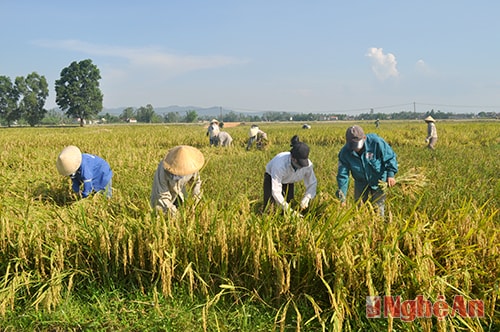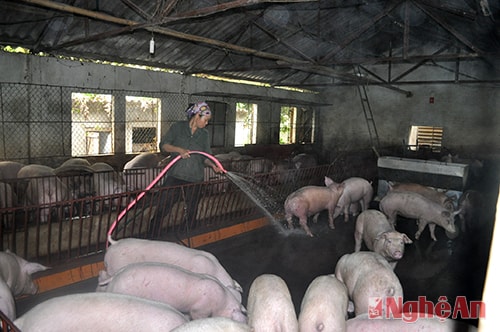Agricultural insurance: "Closer" to farmers
(Baonghean) - After 3 years of implementation, the agricultural insurance pilot program in Nghe An province has achieved many remarkable results. However, it has also revealed shortcomings that need to be resolved when implementing the program on a large scale...
 |
| Harvesting summer-autumn rice crop 2014 in Long Thanh commune (Yen Thanh). |
Farmers' support
Nhan Son is a commune in the "flood center" of Do Luong district. During the rainy season, water from many places flows in, causing flooding and environmental pollution. Almost every year, livestock epidemics occur in the commune. Therefore, farmers in the commune mainly participate in the agricultural insurance program for livestock. The whole commune has 588/985 livestock households participating in the program, mainly poor and near-poor households, eligible for support when participating in insurance. Mr. Ha Van Vinh - agricultural officer of Nhan Son commune said: Starting to participate in the program since 2012, up to now, households have received over 100 million VND in damage support. In fact, since participating in insurance, people have been conscious of voluntarily declaring and destroying livestock when they have an epidemic, instead of hiding the epidemic and selling it "fast" like before. In the low-lying commune of Long Thanh (Yen Thanh), farmers have many times been left empty-handed when the rice crop was damaged by natural disasters. Therefore, when the pilot program on agricultural insurance was implemented, the people here welcomed it quite enthusiastically. Although Mr. Ngo Thanh Toan's family in Dong Yen hamlet, Long Thanh commune had to buy rice many times because the rice was lost due to floods when it was about to be harvested. "There were years like 2010 when the whole field was covered in water. I have bought agricultural insurance for 3 years now with a premium of over 500,000 VND. The amount of money I received in case of crop failure was 7 million VND. If the program continues to be implemented, my family will continue to participate," Mr. Toan shared.
As one of the three localities selected to pilot the rice crop insurance program since 2012, after three years of implementation, Yen Thanh district has had 39/39 communes with nearly 48,000 households participating, with a total insurance premium of over 14 billion VND. According to the general assessment, the program has brought positive impacts and is suitable for local production conditions. In Quynh Luu district, Mr. Nguyen Xuan Dinh - Head of the district's Agriculture Department said: "27 communes with rice production in Quynh Luu all participate in this program. Through implementation in five production seasons, it can be affirmed that this is a policy with a positive impact on agricultural production in general, and rice production in particular. There were years when people in the low-lying areas of Quynh Thanh received support of up to over 1 billion VND from the program."
In the pilot implementation of the agricultural insurance program, Nghe An has 6 participating districts, of which 3 districts participating in rice crop insurance are Yen Thanh, Dien Chau and Quynh Luu; 3 districts in livestock insurance (buffalo, cow, pig) are Do Luong, Thanh Chuong and Tuong Duong. By December 31, 2013, 152,958 households had participated, with insurance premiums of over 78,403 million VND, of which the State budget supported nearly 76,000 million VND. According to the general assessment of the localities participating in the program, compensation for damages was handled promptly and in accordance with regulations, contributing to encouraging farmers to reorganize production and stabilize their lives after natural disasters and epidemics. People have received 8,394 million VND from the program, of which rice crop insurance is 5,994 million VND. The benefits of the program have contributed to promoting agricultural production development and ensuring income for farmers when participating in insurance. The program has also raised farmers' awareness of the necessity of agricultural insurance in production. Timely payment and compensation have created conditions for households to restore production and stabilize their lives after risks and epidemics.
 |
| A pig farm in Thanh Duong commune (Thanh Chuong). |
The shortcomings
Although the benefits of agricultural insurance for farmers have been clearly demonstrated, there are still many shortcomings and limitations in the implementation process for both the buyer and seller of insurance. According to Mr. Nguyen Van Duong - Head of the Department of Agriculture of Yen Thanh district, in the regulations, there are many inappropriate contents. The insurance productivity calculated at 80% of the average productivity of the previous 3 years is not close to reality. The basis for insurance support for farmers is calculated based on the general productivity of the whole commune, specifically, if the rice productivity of the whole commune decreases by 20% or more, farmers will be supported, leading to many cases of people losing their own crops, even though they have participated in insurance but still do not receive support. In addition, when newly planted rice is hit by natural disasters such as storms and floods, it is also required that over 20% of the lost area is supported with funds to replant; at the same time, when there is a natural disaster, there must be a decision announced by the Provincial People's Committee to be supported... all of which are not suitable to actual conditions. That is also the common opinion of localities participating in the pilot program.
Mr. Nguyen Xuan Dinh - Head of the Department of Agriculture of Quynh Luu, said: The determination and assessment of the level of damage as a basis for support is not suitable for actual conditions, when the fields, although consolidated and exchanged, are still fragmented, small, and not concentrated in scale. The insurance productivity must be calculated by year or by crop, and compensation for insurance participants should be calculated based on reality by taking the participant's reduced productivity compared to the insurance productivity to ensure the legitimate rights of the people. In addition, it is necessary to abolish the regulation on the flooded area at the beginning of the crop from 5 ha/commune and calculate compensation for damage at this stage reasonably, accordingly, it is possible to compensate for the amount of damaged seeds at market price for reproduction. At the same time, to facilitate the implementation process, it is necessary to amend and supplement the regulations on natural disasters and epidemics and the epidemic declaration process in accordance with actual conditions.
Regarding livestock insurance, according to Mr. Ha Van Vinh - an agricultural officer of Nhan Son commune (Do Luong), in the regulations, to receive insurance payment, the age of the livestock must be declared, leading to many cases of fraudulent declarations or people are not used to having books to track the raising process, so even if there is real damage, they will not be compensated. Given the current customs, habits and awareness of people about livestock farming, it is advisable to attach number plates to the ears of livestock to track those that are insured. In addition, the compensation price for livestock when participating in insurance is still low, for example, only 9 million VND/buffalo, not taking into account the weight factor... Completing regulations on agricultural insurance close to reality will help to pay insurance in a timely manner, ensure the rights of farmers, and avoid public opinion affecting the propaganda work to mobilize people to participate in insurance during the process of widespread implementation.
Regarding the insurance sales unit, according to the reflection, there are also many difficulties that need to be overcome. Mr. Nguyen Van Trung - Director of Bao Viet Nghe An Company (a unit participating in the program) said: The implementation results are not high, the number of insurance participants is still low, mainly poor households, while near-poor and normal households have not participated much; people do not want to spend money to pay fees, but only want to receive support from the State. This is also a new field, new product, highly specialized so not only farmers but also members of the steering committee at all levels do not really understand, while the propaganda and mobilization work for people is still limited. In addition, the conditions for participating in insurance are not bound by the participating households, so it is difficult to manage and easy to lead to insurance fraud. Regarding actual productivity (rice crop insurance), it depends on many subjective factors such as seasonal changes in variety structure, fertilization and plant protection drugs, but when actual productivity decreases, it is attributed to factors within the scope of insurance such as natural disasters and pests without considering the decrease caused by other causes...
It can be said that in order for the agricultural insurance program to be widely deployed and truly put into practice, it is necessary to have research, discussion, and agreement among the parties participating in the program, creating a higher consensus among farmers - those who directly participate and enjoy legitimate benefits from this important policy of the State.
Article and photos:Phu Huong






